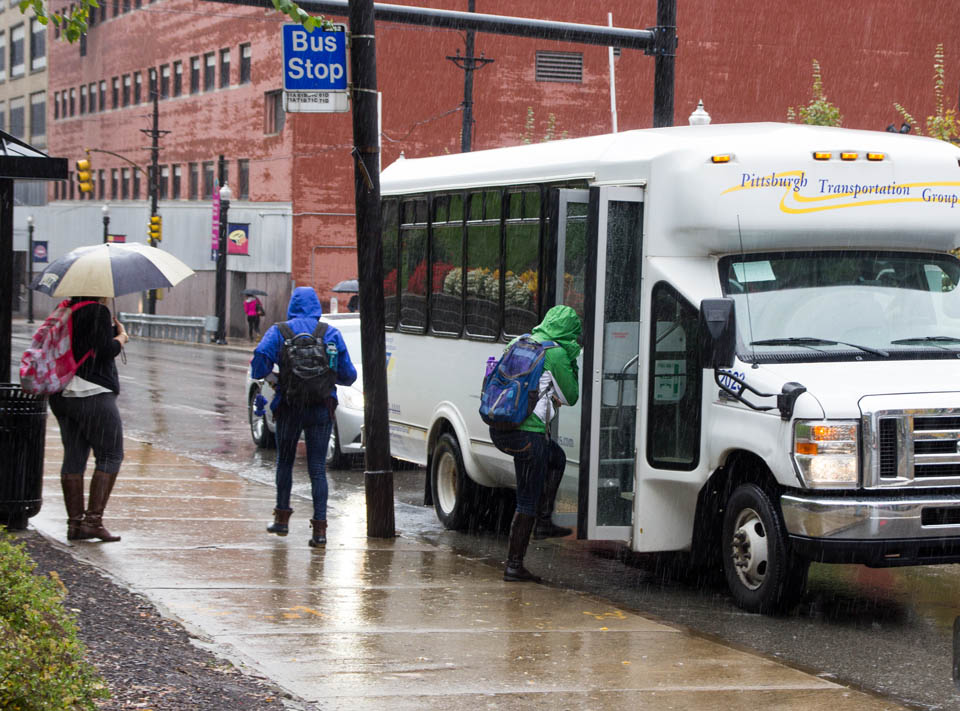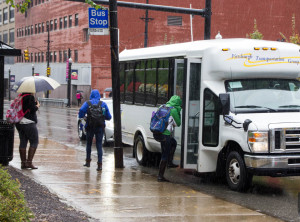

A commuter student boards the South Side Shuttle. Duquesne President Dougherty’s recent comments about “libertine” commuters led to criticisms from parents.
By Julian Routh and Kaye Burnet | The Duquesne Duke
A campus-wide email with a letter from Duquesne President Charles Dougherty — the same letter that was distributed on social media last week — marked the end of the president’s apology for comments he made last week about off-campus living, according to Student Government Association president John W. Foster.
Find the full text of the letter here: President Dougherty’s Letter
The letter was emailed to students by Foster, who met with Vice President for Student Life Douglas Frizzell about the comments Wednesday. Foster said he expressed concerns, on behalf of the students, that Dougherty’s comments were hurtful and offensive.
“That is what I relayed to the administration,” Foster said, “and the response I received was that President Dougherty’s words weren’t intended to offend people, and that if they did, ‘we apologize.’”
After talking with Frizzell, Foster said he believes the administration is not planning a more personal apology, which is something for which several students have asked.
“I think it’s safe to say that there’s not going to be a followup [from Dougherty],” Foster said. “I think that my email served as the ‘end all,’ and that the university is ready to move forward.”
Dougherty declined to be interviewed for this story through Duquesne public affairs.
Dougherty’s words, first reported in The Duke, made national headlines last week after the Associated Press wrote a story that was picked up by more than 40 news outlets, including the New York Times and The Washington Post. Dozens of angry students, parents and alumni took to social media to express their frustration with the comments, which were made during an Oct. 20 faculty meeting.
At the meeting, Dougherty said students who move off campus do so to “flaunt the state liquor laws” and “live a libertine lifestyle that is not allowed on campus.”
“We are aware of the mardi gras that goes on [off-campus] every weekend,” he told a room of more than 100 faculty members.
The comments were criticized campus-wide – and in a staff editorial in last week’s issue of The Duke – as a misrepresentation of why students actually move off campus. Students and parents pointed to cost as the main reason for off-campus living and took offense to the term “libertine,’” which is defined as “a person … who leads an immoral life and is mainly interested in sexual pleasure.”
In the letter of apology sent to students by Foster, Dougherty wrote that he “did not mean to imply that every student who moves off campus does so” to have more freedom with sex, alcohol or drugs.
He also wrote that living off campus “allows for greater access to alcohol, sometimes in violation of state law. It also allows for sexual behaviors that we cannot accept on the campus of a Catholic university.”
The letter was originally sent to Foster last Friday. Foster distributed the letter via social media, but students — and the SGA Senate — requested that the letter be sent out campus-wide.
At the SGA’s meeting Sunday, the senate passed a resolution calling for Dougherty to send another apology to all members of the Duquesne community. It also requested that Duquesne post the full transcription of Dougherty’s speech on the university’s website.
The resolution passed the senate with an overwhelming majority, and SGA Senator Niko Martini delivered a paper copy to Dougherty’s office Tuesday afternoon.
Foster said Wednesday that the transcription request could not be granted because the comments occurred during the question-and-answer portion of the meeting, which was not recorded.
Justin Morden, executive vice president of Duquesne’s Commuter Council, said Dougherty’s comments and apology show how “out of touch” he is with the student body.
“If Dougherty took the time as president to talk to the students, he would know the main reason students choose to live off campus is cost,” Morden said. “By moving off campus, students save money and have much nicer living conditions, and can make their own food. Commuters see this as a way to prepare themselves for their future lives.”
Accounting major Kelly Ebner, 21, lives in the South Side, and said she moved off campus to “grow up a little.”
“There are party schools, but we are not a party school,” Ebner said. “We have students here who really care.”
Several parents of students who live off campus expressed their disappointment over the comments. Mary Morrow, the mother of a current senior living in Mt. Washington, said it’s “ludicrous” to generalize a group of students who are actually making a smart move.
“[Students who move off campus] are making a rational decision economically,” Morrow said.
According to the Duquesne website, undergraduate room and board rates range between $5,094 and $7,443 per semester, or approximately $1,270 to $1,860 per month. According to real estate website Zillow, three students can have their own bedrooms in a shared South Side apartment for less than $400 per person, per month.
However, according to data provided by university spokeswoman Tammy Ewin, Duquesne’s campus housing is less expensive than many other private universities of similar size and background. For example, the Catholic University of America in Washington, D.C. charges its students approximately $1,600 per month. Meanwhile, Carnegie Mellon charges a little over $1,000 per month.
Duquesne spokeswoman Bridget Fare said the university hired a consulting group, Anderson Strickler, LLC, to study the issues surrounding student housing. So far, consultants have conducted student surveys to learn more about why students move off-campus and what improvements they want to housing. Last week, consultants met with a focus group to learn more, and will also survey parents.
Foster said he doesn’t condone Dougherty’s comments, but wants to move forward.
“I’m not saying to forget what was said,” Foster told The Duke. “But how can we look at what has transpired, learn from it and address the bigger concerns? Like housing costs, and students moving off campus. The things that truly matter.”
Dougherty, who has been president since 2001 and earns an annual salary of almost $700,000, plans to retire when his contract ends June 30, 2016.
Brandon Addeo contributed reporting.




